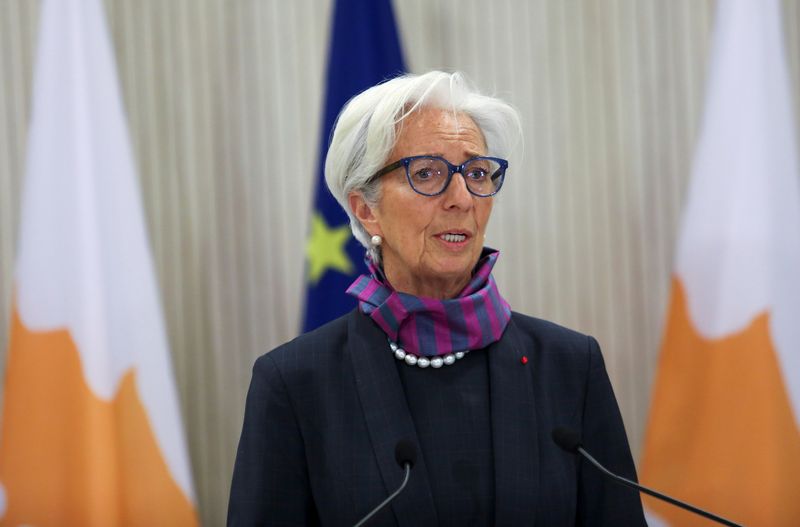ECB to look for signs of stress but banking crisis unlikely
2023.03.22 08:02

© Reuters. FILE PHOTO: President of European Central Bank Christine Lagarde speaks during a joint news conference with Cypriot President Nicos Anastasiades at the Presidential Palace in Nicosia, Cyprus March 30, 2022. REUTERS/Yiannis Kourtoglou
FRANKFURT (Reuters) -The European Central Bank will watch for signs of stress in bank lending from the ongoing financial turmoil but a full-blown crisis is unlikely for now, the ECB’s top brass said on Wednesday.
Investors are pondering whether the ECB will be able to continue raising rates to fight inflation given turmoil in the banking sector that has seen two U.S. lenders go under and Swiss giant Credit Suisse need a last-minute rescue.
The ECB’s chief economist Philip Lane said market jitters may turn out to be “a non-event” for monetary policy, or could affect it at the margins, but the odds on a crisis that completely rewrites the outlook remained long.
“We always run scenarios about… what happens when we get accelerator effects or things amplify each other. But that’s pretty much a tail scenario at this point in time,” Lane told a conference on Wednesday.
Speaking before Lane, ECB President Christine Lagarde said the ECB’s interest rate hikes may be magnified if banks become more risk averse and start demanding higher rates when lending – likely implying the central bank would need to do less.
“If, for example, banks start to apply a larger ‘intermediation wedge’ – meaning that at any level of the base rate they demand a higher compensation for the perceived risk they are taking on when lending – then pass-through will become stronger,” Lagarde said.
She reaffirmed the ECB’s determination to bring inflation in the euro zone to 2%, from 8.5% last month, and noted past hikes were only just starting to be passed onto the economy.
“For inflationary pressures to ease, it is important that our monetary policy works robustly in the restrictive direction,” she said. “And that process is only starting to take effect now.”
The ECB has increased the rate it pays on bank deposits by a record-breaking 350 basis points to 3% since July and financial markets expect a further increase to 3.5% later this year.
The central bank for the 20 countries that share the euro raised rates last week but removed from its policy message an expectation that it would increase rates again at upcoming meetings in light of the recent financial jitters.
Euro zone inflation has already started falling after hitting a peak at 10.6% last October but prices excluding energy are still growing a steady pace.
Lane said he expected core prices to ease over time as lower fuel costs filter through to other sectors.
“There are reasons to believe, by looking at the indirect effect of energy on core, by looking at the pipeline (pressures), that there are data points to suggest that underlying inflation measures will ease over time,” Lane said.
He cautioned, however, that this expectation was predicated on growth in wages peaking this year.








